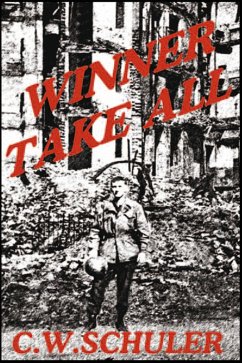WINNER TAKE ALL: A NOVEL
AFTER THE SHOOTING STOPS
C.W. Schuler
The year is 1945! The war ends in Europe!
The American Armed Forces, flush from their victory over the powerful German Werhmacht, now becomes an army of occupation deep in the German Heartland. After disengaging from their combat mission in Czechoslovakia, an American infantry battalion is deployed back across the border into Germany as part of the occupying force.
This is the story of one battalion's transition from the ethical certainties of combat to confronting the daunting complexities of security and civil administration of a foreign population traumatized by six years of war ruthlessly waged by a corrupt and brutal Nazi regime. For the battalion, this final mission was one that some of the young citizen-soldiers were neither properly trained nor temperamentally equipped to implement.
For both men and officers, temptations abound: the seductive allure of power and its consequent abuse; the opportunities for economic plunder through a thriving black market; the easy access to sexual adventure with a population of compliant young women starved by six years of war and deprivation who could often be seduced with as little as a package of cigarettes or a carton of American rations.
The story unfolds through the eyes of an idealistic young officer in the Intelligence Section of the battalion headquarters staff and his struggle to make sense of the moral ambiguities with which he is daily confronted; in addition he is haunted by feelings of personal guilt over an earlier incident at a combat river crossing of the Mosel River. He is also responsible for security at a camp for Displaced Persons, or DP's, as they were known in the military. These were foreign laborers, mostly of Polish origin, conscripted to replace soldiers who had been working in the German armaments industry. Although a small Military Government detachment quartered in a nearby town was technically responsible for organizing some semblance of local administrative authority, the tactical combat troops retained control of all policies concerning internal security in the area.
Despite his best intentions, many of the lieutenant's actions were sabotaged by the hard realities inherent in any military occupation of a foreign culture, both by German civilians struggling to survive, as well as the conflicting agendas of his fellow officers. Frustrated and disillusioned, he is finally led to accept the inevitable truth: that all human actions, no matter how well intended, are subject to the law of unintended consequences which is as implacable and indifferent to human desires as the law of gravity.
AFTER THE SHOOTING STOPS
C.W. Schuler
The year is 1945! The war ends in Europe!
The American Armed Forces, flush from their victory over the powerful German Werhmacht, now becomes an army of occupation deep in the German Heartland. After disengaging from their combat mission in Czechoslovakia, an American infantry battalion is deployed back across the border into Germany as part of the occupying force.
This is the story of one battalion's transition from the ethical certainties of combat to confronting the daunting complexities of security and civil administration of a foreign population traumatized by six years of war ruthlessly waged by a corrupt and brutal Nazi regime. For the battalion, this final mission was one that some of the young citizen-soldiers were neither properly trained nor temperamentally equipped to implement.
For both men and officers, temptations abound: the seductive allure of power and its consequent abuse; the opportunities for economic plunder through a thriving black market; the easy access to sexual adventure with a population of compliant young women starved by six years of war and deprivation who could often be seduced with as little as a package of cigarettes or a carton of American rations.
The story unfolds through the eyes of an idealistic young officer in the Intelligence Section of the battalion headquarters staff and his struggle to make sense of the moral ambiguities with which he is daily confronted; in addition he is haunted by feelings of personal guilt over an earlier incident at a combat river crossing of the Mosel River. He is also responsible for security at a camp for Displaced Persons, or DP's, as they were known in the military. These were foreign laborers, mostly of Polish origin, conscripted to replace soldiers who had been working in the German armaments industry. Although a small Military Government detachment quartered in a nearby town was technically responsible for organizing some semblance of local administrative authority, the tactical combat troops retained control of all policies concerning internal security in the area.
Despite his best intentions, many of the lieutenant's actions were sabotaged by the hard realities inherent in any military occupation of a foreign culture, both by German civilians struggling to survive, as well as the conflicting agendas of his fellow officers. Frustrated and disillusioned, he is finally led to accept the inevitable truth: that all human actions, no matter how well intended, are subject to the law of unintended consequences which is as implacable and indifferent to human desires as the law of gravity.
Dieser Download kann aus rechtlichen Gründen nur mit Rechnungsadresse in A, D ausgeliefert werden.









